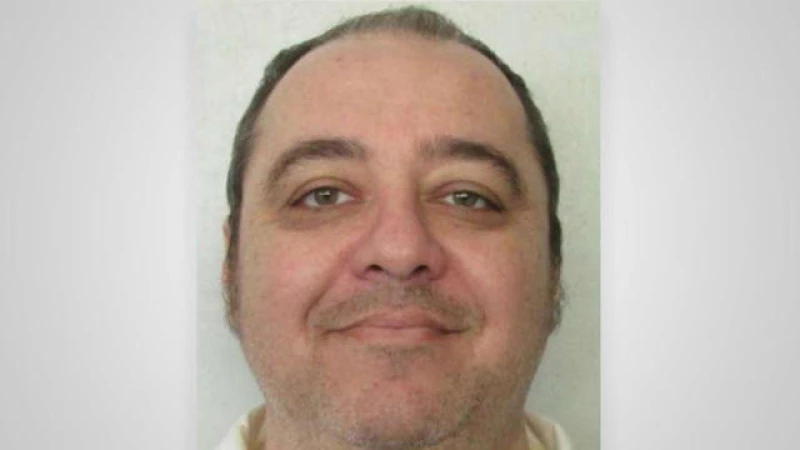UN Urges Alabama to Halt Execution by Nitrogen Hypoxia
The United Nations' top human rights official has called on Alabama authorities to immediately suspend the planned execution of death row inmate Kenneth Eugene Smith. The UN's concerns center around the untested method of execution, known as nitrogen hypoxia, and whether it violates international treaties prohibiting torture.
Ravina Shamdasani, spokesperson for Volker Türk, the UN High Commissioner for Human Rights, expressed alarm over the imminent execution. In a statement released on Tuesday, Shamdasani stated, "We are alarmed by the imminent execution in the United States of America of Kenneth Eugene Smith, through the use of a novel and untested method – suffocation by nitrogen gas, which could amount to torture or other cruel, inhuman or degrading treatment or punishment under international human rights law."
Earlier this month, a group of international consultants, in a statement issued by the UN human rights office, highlighted the lack of scientific evidence supporting the safety and humaneness of nitrogen inhalation as a method of execution. They expressed concern that the use of nitrogen hypoxia could result in a painful and degrading death.
It is worth noting that Kenneth Eugene Smith had previously survived a botched execution attempt by lethal injection in 2022.
The U.N. human rights commissioner on Tuesday expressed "serious concerns" regarding Smith's scheduled execution, stating that it may violate two international human rights treaties that the U.S. has committed to abide by — the Covenant on Civil and Political Rights and the Convention against Torture and Other Cruel, Inhuman or Degrading Treatment or Punishment.
The Covenant on Civil and Political Rights, which was adopted by the U.N. in 1966 and implemented 10 years later, mandates that participating nations respect the civil and political rights of their citizens, including the right to life, due process, and fair trials. Although the U.S. ratified the pact in 1992, it did so with reservations that have raised concerns about the treaty's effectiveness within the country. The U.S. also signed the Convention against Torture around the same time, but included a clause rejecting the treaty's application to capital punishment, provided that the death penalty is carried out in a manner consistent with the Constitution.
John Doe could become the first person in the U.S. to be executed using a new method called nitrogen gas if the scheduled execution takes place on Jan. 25. Doe has been serving time in Alabama for many years after being found guilty as a hitman in the 1998 murder of a preacher's wife. He previously survived a failed execution attempt by lethal injection in November 2022. Alabama has had four unsuccessful lethal injections in the past four years, resulting in prolonged suffering for the inmates and raising concerns about the state's ability to carry out the death penalty.
Due to a national shortage of lethal injections, Alabama approved the use of nitrogen hypoxia as an alternative method of execution in 2018. While Oklahoma and Mississippi also allow this method, it has never been utilized before. The process involves the condemned individual breathing in pure nitrogen or highly concentrated levels of nitrogen through a gas mask until they suffocate.
Given that nitrogen hypoxia has never been tested and even veterinarians refuse to use it for euthanizing animals, many individuals oppose its use in capital punishment cases. They argue that it may cause unnecessary pain and suffering. Additionally, concerns have been raised about the potential health risks posed to others in the vicinity when nitrogen gas is released.
Alabama's Execution Protocol Raises Concerns
Alabama released its first protocol for execution by nitrogen hypoxia in August, and while it outlined some safety measures, the heavily redacted documents also acknowledge the risks of handling nitrogen gas. As the U.N. human rights commissioner noted in Tuesday's statement, "Alabama's protocol for execution by nitrogen asphyxiation makes no provision for sedation of human beings prior to execution," which departs from the American Veterinary Medical Association's recommendation to sedate animals before they are euthanized in this way.
"The protocol also refers to the odourless and colourless gas being administered for up to 15 minutes," the statement said. "Smith has also advanced, with expert evidence, that such an execution by gas asphyxiation in his case risks particular pain and suffering."
A federal judge on Wednesday ruled that Alabama could go ahead with plans to put Smith to death using nitrogen gas. Smith's attorneys had sought an injunction to stop the Jan. 25 execution and accused the state of Alabama of trying to use him as a "test subject" for an experimental method. Smith's lawyer said he intended to appeal the decision, according to the Associated Press.







